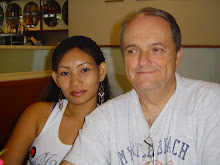The Poor Case For Poetry
America
has become de-versified, that is, we no longer see poetry or verse in our daily
lives. It’s almost as if, like a naughty
child, poetry has been asked to get down from the table and eat under the
stairs. Now, if you want poetry, you
have to go under the stairs and rub shoulders with a lot of artsy-fartsy types who
even make me a little nervous.
So poetry is not a member of the family any more. Who cares?
Well, we all should care because poetry is a different modality
of expression. When we read something, a
book or an essay, the writer does all the work for us (or should at any
rate). All we have to do is lean back
and perceive the work in the same way that we lean back and watch a movie or TV
show. A poem, on the other hand requires
us to lean in – not necessarily in an academic way, but in a way that jump
starts our curiosity - we have to conceive the work.
But more than the conceptual loss is that the prose writer’s
first thought is of you. If he wants to
get published he is on-the-make from word one.
He has to suck up to you Dear Reader, find your conspiracy theory and
issue-oriented hot buttons and press them hard and often. The poet on the other hand, lounging around
in pajamas on Sunday morning, could care less what you, Dear Reader, thinks. The audacity of the man! We can chuck the chapbook under the stairs. Case closed.
So why should we care?
The academic captivity of poets and poetry has not been an
altogether happy success. James Dickey
once said he would still write poetry if he had to clean gutters to support
himself, but when the University
of South Carolina offered
him a posh writer-in-residence job, he took it and never looked back at real
work or unemployment again. Repeated with hundreds of poets across the US,
the disconnect between poetry and the real world is all but complete. Poets, the fortunate, good ones a least, now
live in the in-your-face publish-or-perish liberal arts word. The other not-so-good poets like me are
living under the stairs drooling with envy.
The truth is that poetry needs to be linked to some other
human activity – poetry needs to be paired with something else. This may sound strange, but think of all the
pairing we come across everyday: man and
woman, sun and planets, protons and electrons, matter and antimatter, and the
list goes on. It seems intellectually dishonest
to think we can get to the heart of any matter by looking in one direction
alone when we know that there is a secret sharer, a silent partner dogging our
every step. Poetry is on the periphery of our vision and we need it. It is not so much that we’ll lose our way
without poetry, but we are likely to lose our balance.
Money is key.
Poets don’t make money.
They may make money in other ways, but not with their poetry. To describe poets and poetry without talking
about money is a major omission. In this
sense, I think, poets are close to religious types who take a vow of poverty.
This is another reason why poetry should be linked with something else: poetry
by itself will not make money.
The desire to make poetry part of the family is not
new. Vachel Lindsay toured much of America on foot
in the early 1900s. He traded a small
chapbook for food as he went. He became
successful at this, on a small scale, so that he was actually able to send some
money home. He also tried to make poetry
accessible by giving performances and “singing” his poems. We would consider him odd today, but it is
clear to me he was trying to move poetry away from academia and back home. Yet, Lindsay committed suicide over money
worries. It seems no one told him poets
don’t make money.
My chapbook along with this blog, is my poor case for poetry,
too..
May 8, 2013

